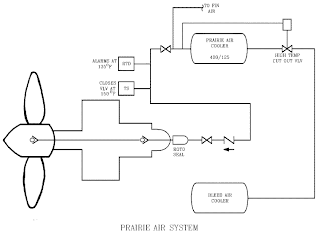 |
| Add caption |
Joule (Constant Pressure) Cycle
Simple gas turbine cycle
Shown above is a simple gas turbine layout. Filtered air is drawn into the system and compressed to about 6 bar. It passes through to the combustion chamber where fuel is introduced and combustion occurs. The hot gas passes through the turbine through to the exhaust. In passing through the turbine it provides motive force for driving the compressor and external requirements.
Advantages and disadvantages
Most modern gas turbine installations are based on aero industry design with suitable marinisation. This takes the form substantially of material changes with respect to the poorer quality fuel used and increased sulphur content.
Specific fuel consumptions of 360g/kWh are possible with simple installations. Heat recuperation from the exhaust and gas inlet temperatures of 650'C can improve this to 280g/kWh.
Where inlet temperatures can be increased to 1200'C this falls further to 200g/kW/h. Very special materials are required to make this possible with ceramic and cooled metallic blades being fitted This compares to the 140g/kWh possible in some large slow speed diesel installations. The advantage of the gas turbine falls mainly around its compact size, low weight and reduced maintenance requirements Gas turbine plant was very much out of favour for a long time due to its poor fuel consumption. Emergency generators and fire pumps saw some applications. With improved performance and more flexible plant design- controllable pitch propellers and electrical drives- the much reduced engine size and high power to weight has seen some operators specify this plant especially for high speed ferries
Modern Design
The above shows a typical layout of a marine gas turbine with thermal efficiency of 38-40%. The NOx ouput is about 1/10 that of a marine slow speed diesel. The turbine inlet temperature is up to 1200'C and requires critical blade design and material choice.
Shown is a single comuster, in reality there will be several equally spaced around the assembly.
Specific fuel consumption is about 257 g/kWh
No comments:
Post a Comment